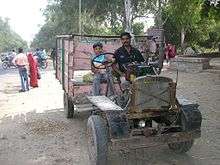Jugaad

Jugaad (alternatively Juggaar) is a colloquial Hindi (Devanagiri जुगाड़) and Punjabi word, which has various meanings depending on the situation. Mainly jugaad is called DIY or INNOVATIVE thinking in rest of the world.Its literal meaning is machinery. When used in daily conversations, it may mean a mechanical solution to a problem, work around to skip or solve a problem.
In Pakistan and India jugaad lagana could also mean using one's social connections, past favors or downright bribery to persuade an officer to act cooperatively against routine or standard practices. It generally means an innovative fix or a simple work-around, a solutions that bends the rules, or a resource that can be used in such a way, or a person who can solve a complicated issue. It is often used to signify creativity—to make existing things work, or to create new things with meager resources.
Jugaad is increasingly accepted as a management technique[1] and is recognized all over the world as an acceptable form of frugal engineering at peak in India.[2] Companies in India are adopting Jugaad as a practise to reduce research and development costs.[3] Jugaad also applies to any kind of creative and out of the box thinking or life hacking, which maximizes resources for a company and its stakeholders.

According to experts at the University of Cambridge Jugaad is an "important way out of the current economic crisis in developed economies and also holds important lessons for emerging economies".[4]
Etymology and variants
Pronounced the same in Urdu, Hindi, and Punjabi, it is pronounced as "jugaard" or "jugaardh." Urdu transcriptions spell it as "jugaar" because the last letter in the Urdu word is closer to R than D (ṛē).
Low-cost vehicle

Jugaad can also refer to a quadricycle, a means of transportation in north India, made of wooden planks and old jeep parts, variously known as kuddukka and pietereda. However, Jugaad could be used as a term for any low cost vehicle which typically costs around Rs. 50,000 (about US$800).[5] Jugaads are powered by diesel engines originally intended to power agricultural irrigation pumps. They are known for poor brakes, and cannot go faster than about 60 km/h (37 mph). The vehicle often carries more than 20 people at a time in remote locations and poor road conditions. Today, a jugaad is one of the most cost effective transportation solutions for rural Indians.
Though no statistical data is available, it is reported that there are a number of instances of failing brakes, requiring a passenger to jump off and manually apply a wooden block as a brake. As part of research for his 2013 book, Innovation and a Global Knowledge Economy in India, Thomas Birtchnell, a lecturer of Sustainable Communities at University of Wollongong, Australia, found that of 2,139 cases of road traffic casualties in 72 hours at J N Medical College hospital in Aligarh, 13.88 per cent of pedestrian casualties were due to jugaad. It was stated by Minister of State for Road Transport and Highways Pon Radhakrishnan that Jugaads do not conform to the specifications of a Motor Vehicle under the Motor Vehicles Act, 1988.[6] These vehicles hence do not have any vehicle registration plate and they are not registered with the Regional Transport Office (RTO). Hence, no road tax is paid on them, neither there exists any official count of such vehicles.
Jugaads are not officially recognized as road-worthy, and despite a few proposals to regulate them, vote-bank politics have trumped safety concerns. The improvised vehicles have now become rather popular as a means to transport all manner of burdens, from lumber to steel rods to school children.[7] For safety reasons the government of India has officially banned Jugaad vehicles.[8]
Vehicle variants

A variant of the Jugaad vehicle in Tamil Nadu in South India is the Meen Body Vandi. This roughly translates to "fish bed vehicle" because they originated among local fishermen who needed a quick and cheap transport system to transport fish. It is a motorized tri-wheeler (derived from the non-motorized variant)[9] with a heavy-duty suspension and a motorcycle engine—typically recycled from Czech Yezdi or Enfield bullet vehicles. Its origins are typical of other Jugaadu innovations—dead fish are typically considered unhygienic, and vehicles that carry them cannot be typically used to carry anything else. Similar vehicles can be found throughout much of Southeast Asia.[10]
See also
Similar terms:
- Bodge, an English term of similar meaning
- Chindōgu, a Japanese term for deliberately "un-useful" inventions, created as a hobby and entertainment.
- Redneck Technology An American term of similar meaning for innovations or improvisation using locally available materials
- Gung-ho, a technique of guerilla industry employed at the Chinese Industrial Cooperatives in WWII
- Kludge, an American-English term of similar meaning
- System D in French, is a shorthand term that refers to a manner of responding to challenges that requires one to have the ability to think fast, to adapt, and to improvise when getting a job done
Notes
- ↑ "Jugaad: A New Growth Formula for Corporate America". Harvard Business Review Blog Network. 25 January 2010.
- ↑ "India's Next Global Export: Innovation". Bloomberg Businessweek. 2 December 2009.
- ↑ "A snip at the price". The Economist. 28 May 2009.
- ↑ http://www.hindustantimes.com/india/cambridge-expert-says-indian-jugaad-is-lesson-to-world/story-M3q6vFu8tEPj8eSNsAJo5M.html
- ↑ "Rural India’s jugaad for cheap travel - Livemint". www.livemint.com. Retrieved 2016-04-09.
- ↑ "One hack of a vehicle". The Indian Express. 2015-10-25. Retrieved 2016-04-09.
- ↑ "Bal Mandir Public School Transportation".
- ↑ "Govt issues order to seize jugaads". The Times of India. indiatimes.com. Retrieved 12 July 2013.
- ↑ "Indian Tripurteurs A7".
- ↑ "Motor Tricycle-Motor Tricycle Manufacturers, Suppliers and Exporters on alibaba.com".
Further reading
- Navi Radjou, Jaideep Prabhu, Simone Ahuja, foreword by Kevin Roberts (2012). Jugaad Innovation: Think Frugal, Be Flexible, Generate Breakthrough Growth. Wiley. p. 288. ISBN 978-1-1182-4974-1.
- Rishikesha T. Krishnan. From Jugaad to Systematic Innovation: The Challenge for India.
- Barun S. Mitra. "India's 'Informal' Car". Asian Wall Street Journal, page 10, 26 Jan 1995.
- Mcclellan, Philip. "Is Jugaad Going Global?". Ny Times.
- Rajnish Tiwari, Cornelius Herstatt. "Open Global Innovation Networks as Enablers of Frugal Innovation: Propositions Based on Evidence from India" (PDF).